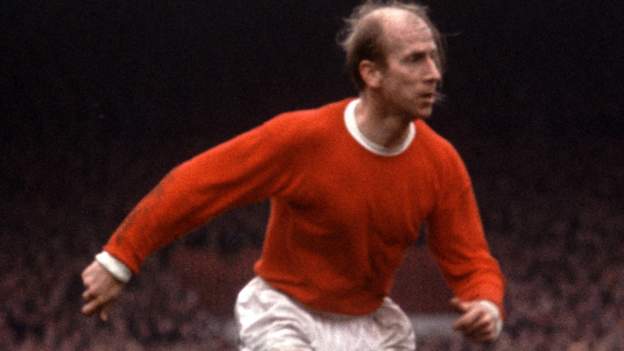Sir Bobby Charlton, the Manchester United legend who was a key figure in England’s 1966 World Cup victory, has died at the age of 86.
Charlton won 106 caps for England and scored 49 international goals – records for his country at the time.
During a 17-year first-team career with United he won three league titles, a European Cup and an FA Cup.
Charlton’s family said he “passed peacefully in the early hours of Saturday morning”.
In November 2020, it was announced Charlton had been diagnosed with dementia.
He died surrounded by his family, who said in a statement they wished to “pass on their thanks to everyone who has contributed to his care and for the many people who have loved and supported him”.
“We would request that the family’s privacy be respected at this time,” their statement added.
United paid a fond tribute to Charlton, describing him as “one of the greatest and most beloved players in the history of our club”.
“Sir Bobby was a hero to millions, not just in Manchester, or the United Kingdom, but wherever football is played around the world,” the club said.
“He was admired as much for his sportsmanship and integrity as he was for his outstanding qualities as a footballer; Sir Bobby will always be remembered as a giant of the game.
“His unparalleled record of achievement, character and service will be forever etched in the history of Manchester United and English football and his legacy will live on through the life-changing work of the Sir Bobby Charlton Foundation.
“The club’s heartfelt sympathies are with his wife Lady Norma, his daughters and grandchildren, and all who loved him.”
His death leaves Sir Geoff Hurst – the striker who scored a hat-trick in England’s 4-2 win over West Germany in the 1966 final – as the sole surviving member of the triumphant team.
Hurst posted on X, formerly Twitter: “Very sad news today. One of the true Greats Sir Bobby Charlton has passed away. We will never forget him and nor will all of football. A great colleague and friend, he will be sorely missed by all of the country beyond sport alone. Condolences to his family and friends.”
Charlton’s older brother Jack, who died in July 2020, and their fellow World Cup winner Nobby Stiles, who passed away in October 2020, had also both been diagnosed with dementia.
An Old Trafford legend
Born in Ashington, Northumberland on 11 October, 1937, Charlton joined Manchester United as a schoolboy in 1953, turning professional the next year and making his first-team debut against Charlton Athletic in October 1956, aged 18.
In February 1958, he was a survivor of the Munich air crash in which 23 people died, including eight of his United team-mates.
He became a focal point of manager Matt Busby’s rebuilding effort. Joined by Denis Law and George Best, Charlton inspired United to a first European Cup win in 1968, scoring twice in the final against Benfica.
He had been awarded the Ballon d’Or in 1966 after playing every minute of England’s World Cup victory.
Charlton went on to break United’s scoring and appearance records – netting 249 goals in 758 games before leaving the club in May 1973.
Those long-standing records were eventually broken, with Ryan Giggs finishing on 963 games and Wayne Rooney scoring 253 goals.
After leaving Old Trafford, Charlton spent two years as manager and player-manager at Preston North End before resigning in August 1975.
In the following year, he played briefly in the Republic of Ireland before moving into the boardroom at Wigan Athletic, where he also had a spell as caretaker manager.
In June 1984, he became a director at his beloved United and 10 years later he was knighted, having previously been awarded an OBE and CBE.
Charlton came second in the BBC Sports Personality of the Year Award in 1958 and 1959. In 2008, he received the Lifetime Achievement award.
United renamed Old Trafford’s South Stand in his honour in 2016 as it became the Sir Bobby Charlton Stand.
Dementia in football
Charlton was the fifth member of England’s 1966 World Cup-winning side to be diagnosed with dementia.
In addition to his brother, Jack, and Stiles, both Ray Wilson, who died in 2018, and Martin Peters, who died in 2019, had the condition.
Stiles, Peters and Wilson were diagnosed with it while still in their sixties.
Charlton’s wife, Lady Norma, expressed the hope that the knowledge of his diagnosis could help others.
Sir Bobby was the best player in the world – Beckenbauer
Charlton’s stature in Sir Alf Ramsey’s England team led to him being given a special role in the 1966 World Cup final at Wembley.
He was one of the team’s key attacking talents – scoring three times in the earlier rounds, including two in a 2-1 victory over Portugal in the semi-final – yet he was asked to man-mark West Germany’s playmaker Franz Beckenbauer.
“I had waited my whole life to play in a World Cup final and I am asked to man-mark, which I had never done before,” said Charlton. “But when the whistle went, Franz Beckenbauer came straight to me – he had been given the same instruction.”
While Ramsey was concerned about the potential impact Beckenbauer might have on the final, the West Germany manager Helmut Schon had the same fears about Charlton.
The pair effectively cancelled each other out – Charlton acknowledged that neither player “had much impact on the final”.
But the tactic gave other England players, such as hat-trick hero Hurst, the chance to make their own mark on history.
And Beckenbauer saw at close quarters just why his manager had been so concerned.
He said: “[Charlton] was the engine of the England game. In this game I realised how difficult it is to follow him and to mark him because in my opinion, in 1966 in the World Cup, he was the best player in the world.”
